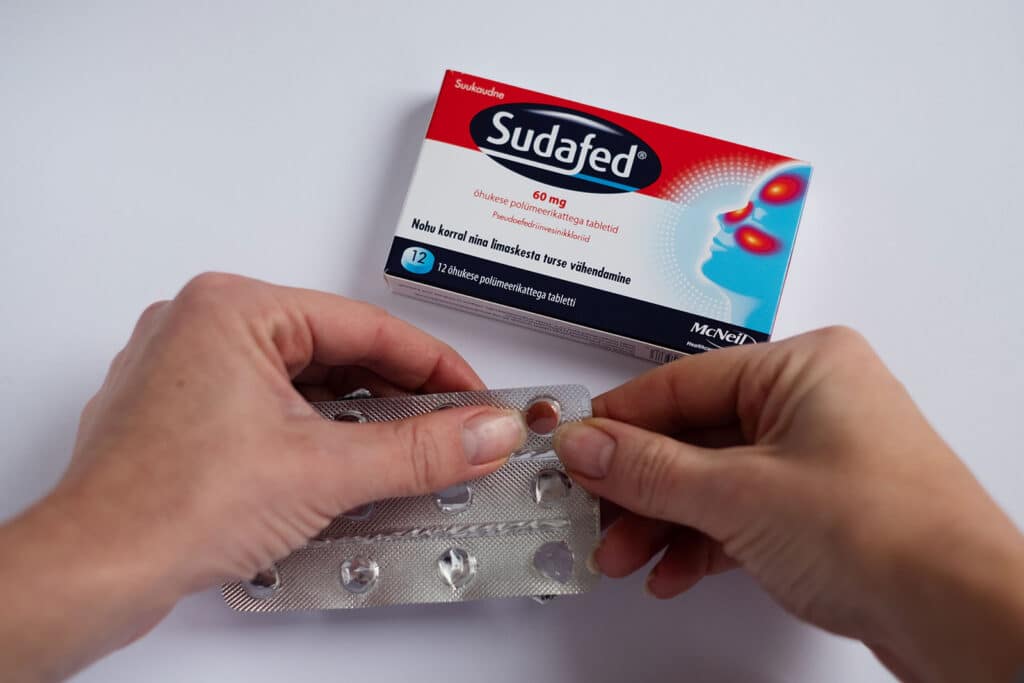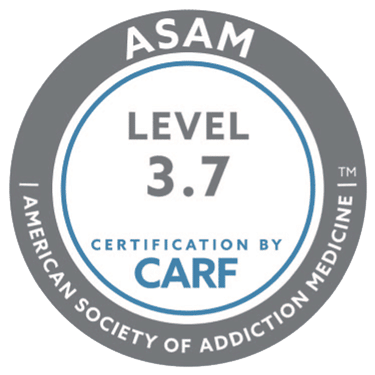Many people turn to Sudafed to relieve symptoms of allergies or a lingering cold, such as nasal congestion, sinus pressure and coughing. Since Sudafed is available over-the-counter (OTC), many don’t think about potential interactions with other substances, including alcohol. However, healthcare professionals strongly advise against mixing Sudafed with alcohol due to an increased risk of side effects.
While Sudafed is generally safe when used as directed, combining it with alcohol can intensify possible side effects like dizziness and drowsiness. More seriously, it can also cause dangerous fluctuations in blood pressure, which in some cases could be life-threatening. It’s important to always consult with a healthcare professional if you have any questions about the safety of mixing medications, even those with a familiar brand name like Sudafed.
What Is Sudafed and How Does It Work?
The active ingredient in Sudafed is pseudoephedrine, a nasal decongestant that temporarily narrows blood vessels and reduces congestion and swelling. It is effective for providing temporary relief from sinus pressure, a stuffy nose and other bothersome symptoms associated with a cold or allergies. Sudafed can be used to treat various conditions, including:
- Flu
- Hay fever
- Sinus pressure
- Nasal congestion
- Common cold
- Sinusitis
- Bronchitis
- Asthma
Some Sudafed products may contain additional medications such as naproxen or acetaminophen to treat fever or pain associated with headaches, arthritis or toothaches. Because pseudoephedrine is a primary ingredient used in the production of methamphetamine, it is heavily regulated and monitored by the federal government. Some people may also misuse it to combat fatigue or sleepiness as well as to decrease appetite.
What Happens When You Mix Alcohol and Sudafed?
Although mixing Sudafed and alcohol is not officially contraindicated, healthcare professionals advise against this practice. Pseudoephedrine (the active ingredient in Sudafed) is a stimulant, while alcohol is a depressant. Stimulants can mask the inebriated effect of alcohol, which may lead to excessive alcohol consumption. Because stimulants mask the tipsy feeling that alcohol produces, it may make you feel more awake and less intoxicated. However, combining Sudafed with alcohol may also increase your risk of alcohol-related injuries and raise your chance of alcohol poisoning.
Using alcohol alongside other medications is not advisable for several reasons. While Sudafed generally has mild side effects when taken alone, they may intensify if you drink alcohol. Combining both may lead to increased vomiting, nausea, headaches and difficulty sleeping. Additionally, using them together may increase your risk of dizziness, drowsiness and an increased heart rate. There is also a heightened risk of dry mouth and dehydration.
Individuals with a history of heart problems or high blood pressure should be cautious when taking Sudafed because they face an increased risk of serious complications. If you have combined Sudafed and alcohol and are experiencing an adverse reaction, it’s best to contact your doctor rather than wait for these side effects to resolve on their own.
Why Do People Take Sudafed and Alcohol Together?
Given the potential risks involved, you might wonder why some individuals would mix alcohol with Sudafed. Unfortunately, many people are unaware of the dangers of combining medications and alcohol.
Although alcohol is not an effective treatment for any illnesses, some people may use it to alleviate their symptoms. In these cases, they may also take Sudafed during the same timeframe. In other situations, those addicted to alcohol or who are heavy drinkers may not see a reason to stop drinking while sick. Therefore, they may take several medications to try to feel better while continuing to drink.
Health Risks of Combining Alcohol and Medications
There are many possible health risks involved when consuming alcohol with medications. Alcohol can make medicines work less effectively by impacting the way it is absorbed into your digestive tract. Additionally, alcohol can raise the concentration of the medication in your blood to dangerous levels.
Many types of medications, including over-the-counter ones, can be harmful when combined with alcohol. Regularly drinking to excess increases the risk of adverse reactions, including overdose and death. Mixing opiate medications or drugs with alcohol can cause breathing to slow down to a dangerous rate, potentially leading to fatal outcomes. Some estimates suggest that alcohol contributed to at least 17.4% of deaths caused by opioid overdoses in 2020.
Approximately 48% of adults in the United States may be living with high blood pressure, while millions may also live with an anxiety disorder. While these conditions are treatable with prescribed medications, combining alcohol with them may reduce their effectiveness. High blood pressure is often treated with ACE inhibitors like lisinopril. Lisinopril decreases the amount of certain chemicals that tighten blood vessels. Mixing alcohol with lisinopril may cause blood pressure to decrease significantly, causing dizziness or lightheadedness.
Benzodiazepines are commonly prescribed for those diagnosed with anxiety disorders. Since both benzodiazepines and alcohol affect GABA neurotransmitters in the brain, combining these substances can lead to severe respiratory issues, including the risk of death.
The liver’s primary responsibility is to metabolize toxins, including drugs and alcohol. When alcohol is consumed alongside medications, it increases stress on the liver. Continuing to drink alcohol while taking medications may increase your risk for liver damage over time.
What You Should Do Instead
If you are not feeling well and are taking Sudafed to manage your symptoms, you should avoid alcohol until you discontinue use. Drinking alcohol not only increases your risk of experiencing significant side effects but also weakens your immune system, making it difficult for your body to fight viral and bacterial infections. If you are unwell, it’s best to avoid alcohol and use the following tips to manage your symptoms:
- Sip on chicken soup – Although there is no proof that chicken soup can cure a common cold, the ingredients contain important nutrients that may support your immune system and keep you hydrated.
- Drink ginger tea – If you’re feeling achy and nauseous, research indicates ginger tea may help soothe your stomach and alleviate muscle pain. You can consume ginger as a tea by simmering slices of ginger root in hot water.
- Add honey to your beverages – Honey has antibacterial properties, and adding a few spoonfuls to your tea may ease your sore throat and act as a natural cough suppressant.
- Consume more garlic – Studies show that incorporating garlic into your diet may not only reduce the severity of cold symptoms but might also help you avoid getting sick in the first place. Although additional research is needed to support these claims, adding garlic to your meals can help you start feeling better soon.
- Take a steamy shower – Increasing the humidity in the air can reduce inflammation and dryness in your nose and throat. You may also consider putting a humidifier in your room and adding a few drops of eucalyptus oil to the water to relieve congestion.
While boosting your immune system may not help if you are already sick with a cold or the flu, it can help prevent you from falling ill in the future and reduce the severity of your symptoms. Some ways to support your immune system include getting plenty of rest, eating a nutritious diet, exercising regularly and receiving your flu shot every year.
Recreate Behavioral Health’s Commitment to Wellness
Recreate Behavioral Health remains dedicated to educating the public about substance safety and how to minimize the risks of adverse effects when consuming alcohol and taking prescription and over-the-counter medication. We provide information about alcohol interactions with various medications, as well as the potential dangers of mixing substances. We can also help you understand the effects of alcohol on your body and mind, including how it can contribute to feelings of intoxication and interact with pre-existing health conditions.
If you are concerned with potential drug interactions or are worried you or a loved one may have a problem with alcohol use, seek out professional help today. It’s important to remember that substance abuse can affect not only physical health, but also mental health. Recreate Behavioral Health can help you explore treatment options and take that first step toward a brighter future in recovery. Don’t hesitate to reach out for medical advice if you have any concerns about substance use or its impact on your well-being.










